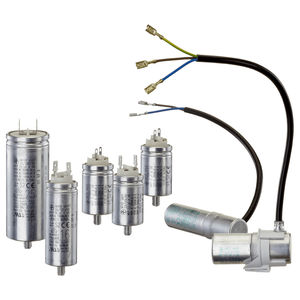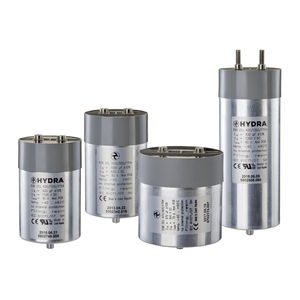
Lighting capacitor LF seriesmetalized polypropylene filmaxialdischarge
Add to favorites
Compare this product
Characteristics
- Type
- metalized polypropylene film
- Configuration
- axial
- Technical characteristics
- discharge, self-healing
- Applications
- for lighting
- Voltage
Max.: 500 V
Min.: 250 V
Description
General
Hydra capacitors for fluorescent and gas discharge lamps are selfhealing capacitors provided with overpressure disconnectors (Type
B according to EN 61048) that are used for series and parallel compensation. Hydra capacitors for series and parallel compensation
are available for the following rated voltages and temperature ranges:
Capacitors for parallel compensation
250 V; 50/60 Hz; - 40°C ... + 85°C / 100°C
Capacitors for series compensation
480 V; 50/60 Hz; - 25°C ... + 100°C
500 V; 50/60 Hz; - 25°C ... + 85 °C
Safety
Capacitors can fail under extreme operating conditions as well as
after reaching the end of the lifetime. Hydra capacitors for series
and parallel compensation are manufactured with integrated overpressure disconnector. In case of destruction, a gas generation and
an increase in temperature inside of the capacitor effect an internal
pressure rise. The capacitor will expand in the axial direction up to
about 9 mm. Due to the expansion, the thinner section of the fuse
will breake and the capacitor will be disconnected safely from the
mains.
Hydra capacitors are certified by the VDE Testing and Certification
Institute and fulfill the safety regulations of EN 61048/49 regarding
flame and burst proof capacitors
Catalogs
Related Searches
- Capacitor
- Film capacitor
- Power capacitor
- Cylindrical capacitor
- Electrolytic capacitor
- Switching power supply capacitor
- Self-healing capacitor
- Filter capacitor
- Industry capacitor
- Aluminum capacitor
- Three-phase capacitor
- Axial capacitor
- Electric motor capacitor
- Discharge capacitor
- DC-link capacitor
- Oil-filled capacitor
- Lighting capacitor
*Prices are pre-tax. They exclude delivery charges and customs duties and do not include additional charges for installation or activation options. Prices are indicative only and may vary by country, with changes to the cost of raw materials and exchange rates.







